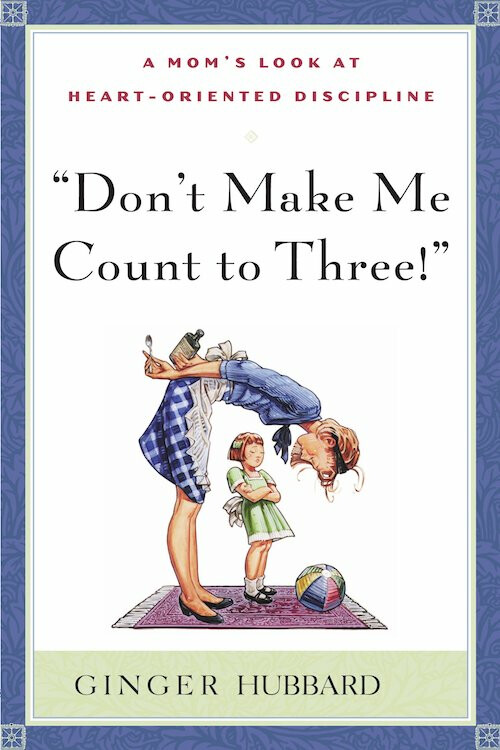Discipline with Young Children

Discipline is a necessary part of a relationship with your child. By properly disciplining your child, you will help to point them toward Christ.
Disciplining Young Children
The scriptures command parents to raise children in the training and instruction of the Lord. We begin “training” a child from a very young age by the ways we respond to their actions and attitudes. The primary purpose of discipline is to consistently direct your child toward right relationship with God and others. Several practices contribute to that process.
PRACTICE ONE: Establish Your Authority
 Children need a clear answer to the question “Who is the boss?” Mom and Dad embody the security and limits that come from submitting ourselves to a loving heavenly Father. God has delegated oversight of your child’s welfare and development to you by placing you in a position of authority over them.
Starting when children are very young, parents need to model clarity and consistency. Unclear rules and sporadic reinforcement breed insecurity. You must say what you mean, mean what you say, and act upon it. Do not overlook defiant behavior just because the specific issue seems minor or because it is a hassle to stop and discipline at the moment. Children are commanded to obey their parents and parents to train their children even when it is inconvenient to do so (see Colossians 3:20-21).
Children need a clear answer to the question “Who is the boss?” Mom and Dad embody the security and limits that come from submitting ourselves to a loving heavenly Father. God has delegated oversight of your child’s welfare and development to you by placing you in a position of authority over them.
Starting when children are very young, parents need to model clarity and consistency. Unclear rules and sporadic reinforcement breed insecurity. You must say what you mean, mean what you say, and act upon it. Do not overlook defiant behavior just because the specific issue seems minor or because it is a hassle to stop and discipline at the moment. Children are commanded to obey their parents and parents to train their children even when it is inconvenient to do so (see Colossians 3:20-21).PRACTICE TWO: Discipline Rather Than Punish
Punishment is negative, making someone pay for what they have done. Discipline is positive, training toward a better future. Like touching a hot stove, we learn from the consequences of our actions. Discipline in childhood helps children avoid “learning the hard way” later in life.
Many parents ask about the use of spanking to help shape a child’s will. The scriptures teach that “Foolishness is bound up in the heart of a child; the rod of correction will drive it far from him.” (see Proverbs 22:15, 13:24 & 29:15). Administering “the rod” apart from Biblical principles, however, can cause more harm than good. Corporal discipline should only be used within guidelines such as those offered by Christian parenting experts. Several books can help you learn to apply spanking, time-out, and other methods of discipline in healthy and productive ways.
Regardless of which form of discipline you use, the key is consistency. As author Ginger Plowman explains, it is not the severity of punishment but the “certainty of consequence” that makes the difference.
God holds parents accountable for how they use the authority He has given them. The scriptures instruct parents not to “exasperate” or “embitter” their children (Colossians 3:21). Do not treat childish immaturity the same as willful defiance. Parents should never discipline children out of embarrassment, frustration, or anger. Accidentally spilling the milk or waking the baby is not an occasion for stern discipline. Ignoring direct disobedience can make a child vulnerable to an ongoing spirit of rebellion.
Parents are called to protect their children from the ruin of an undisciplined life and point them to their need for a Savior (Proverbs 23:14 & Romans 3:22-24). Ultimately, the discipline you apply should be used in a way that restores right relationship. It should provide a consequence that leads the child to repentance (sorrow for their wrong behavior) and restoration of the relationship with mom, dad, and others.
PRACTICE THREE: Lovingly Instruct
Starting in the preschool years, discipline and instruction should become a package deal (Ephesians 6:4). Do not make the mistake of allowing your desire for changed behavior replace your desire for a changed heart. Use simple probing questions and share specific scriptures about wrong choices to instruct your child toward repentance. After disciplining a two-year-old temper tantrum, for example, you might explain that “God wants us to obey.” With a four-year-old you can go further, explaining self-control, by reading Titus 2:6 and asking the child “Do you think that you were self-controlled or out of control?” Such loving instruction after discipline helps train your son or daughter to think like a follower of Christ rather than merely behave in order to avoid punishment.
recommended books
The New Strong-Willed Child
By Dr. James Dobson
Is a willful little darling driving you to distraction? The New Strong-Willed Child is the resource you need—a classic bestseller completely rewritten, updated, and expanded for a new generation of parents and teachers. Challenging as they are to raise, strong-willed children can grow up to be men and women of strong character—if lovingly guided with understanding and the right kind of discipline. Find out what Dr. James Dobson, today’s most trusted authority on parenting, has to say about what makes strong-willed children the way they are; shaping the will while protecting the spirit; avoiding the most common parenting mistake; and much more. If you are struggling to raise and teach children who are convinced they should be able to live by their own rules, The New Strong-Willed Child is a must-read! (This new edition is part of Dr. James Dobson’s Building A Family Legacy initiative.)
Parenting is Heart Work
By Dr. Scott Turarsky and Joanne Miller
If you're like most parents, you have developed your own parenting strategy—sometimes it seems to work, and other times—based on the way your child behaves—you wonder if it's working at all. There are countless ways to try to get a child's attention and to effect change—but here's the truth—unless you deal with a child through his or her heart, you are not likely to see lasting change. In this breakthrough book, Dr. Scott Turansky and Joanne Miller, RN, BSN, reveal how you can learn to truly reach your child's heart to teach, train, and build a tremendous relationship.Parenting is Heart Work gives you the practical tools an easy-to-follow steps that will revolutionize how you: turn correction times into learning experiences; equip your children to accept responsibility for their mistakes and meditate on the right things; influence and adjust the values and beliefs your children hold; maintain relationship with your children through love and emotional connectedness.
Don’t Make Me Count to Three
By Ginger Plowman
Do you find yourself threatening, repeating your instructions, or raising your voice in an attempt to get your children to obey? Are you discouraged because it seems you just can not reach the heart of your child? Through personal experience and the practical application of Scripture, Ginger Hubbard encourages and equips moms to reach past the outward behavior of their children and dive deeply into the issues of the heart. Her candid approach will help moms move beyond the frustrations of not knowing how to handle issues of disobedience and into a confident, well balanced approach to raising their children.
Shepherding a Child's Heart
By Tedd Tripp
In this revised edition of Shepherding a Child's Heart, Dr. Tedd Tripp not only draws on his thirty years of experience as a pastor, counselor, school administrator, and father, but he also shares insights gained in ten years of teaching this material in conferences worldwide, providing more valuable help for parents.





